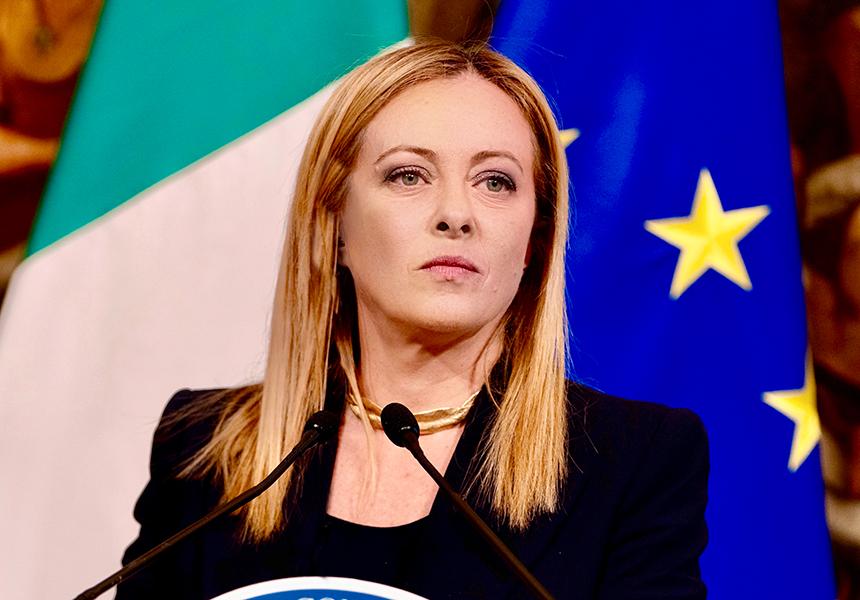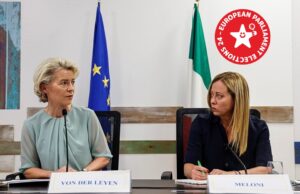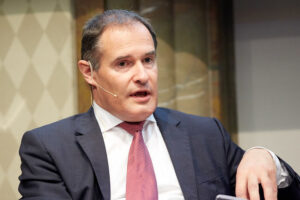The government led by Giorgia Meloni has been in place since end of October 2022’s general elections which led to the victory of the right-wing coalition and the transformation of Brothers of Italy into the leading Italian party.
The Ideological Evolution of Fratelli d’Italia
The domestic and international interest in this political change that put an end to a series of coalitions of various stripes, often heterogeneous and led by apparently neutral “technical” figures such as Mario Draghi, was fully justified by the success of a political party that explicitly claims continuity with Italian neo-fascism.
Commentators and analysts were divided even before the vote between those who highlighted the elements of continuity in Brothers of Italy (Fratelli d’Italia – FdI) with this past and those who instead considered the ideological divide of fascism and anti-fascism to be completely overcome. The latter see FdI as a right-wing force but one that is completely integrated into the normal parliamentary game.
The characterisation of Fratelli d’Italia actually requires a less simplistic assessment. Meloni has tried to redefine the ideological profile of her party (of which she is for now the undisputed leader) as a conservative-nationalist force. There is no shortage of occasional statements from party members that unequivocally reveal their political background, given that a large part of the party’s leadership and cadres come from the Fronte della Gioventù, a youth organisation of the for a long time openly neo-fascist Italian Social Movement.
On the ideological level, if on the one hand FdI presents fascism as an outdated historical phenomenon, on the other it aims to erase anti-fascism from public discourse as the ideal foundation on which Italian democracy was built after the Second World War. The reference to the Resistance which opposed the Nazi occupation and Mussolini’s collaborationist regime is presented as a narrative that divides the “Nation” by excluding all those who did not join the anti-fascist coalition.
The refusal to endorse anti-fascism also enables some of fascism’s specific ideological orientations (ethnic nationalism, a hierarchical and non-intercultural vision of society, anti-communism, and an authoritarian conception of the state) to be transmitted in a new context, adapting them to an obviously different historical context. These roots are integrated by means of subscribing to liberalism, for which Reagan and Thatcher are claimed as models. From this point of view Fratelli d’Italia differs from the economic outlook proclaimed by Marine Le Pen, considered too social if not even “socialist”, preferring the more explicit ultra-liberalism of Eric Zemmour.
Foreign Policy Stances
The practice of the Meloni Government, now in office for a year and a half, allows us to put aside the rhetoric and electoral demagogy and identify the fundamental features of the neo-fascist-derived right. Certainly, the Prime Minister moved with a certain caution so as not to find herself isolated on the international level.
Budget management was carried out in continuity with Mario Draghi’s government while some of the measures that had been adopted on the initiative of the 5 Star Movement, such as the “citizen’s income” and the so called superbonus (public financing for building renovations), were cancelled.
To acquire legitimacy in the eyes of Europe and Washington, full commitment to economic, diplomatic, and military support for Ukraine was fundamental. Although various forces within the government harboured strong sympathy for Putin’s social conservatism and authoritarian tendencies, Meloni decisively changed course to support Ukraine.
In the history of the Italian Social Movement – after the oscillations of the first post-war years during which the United States was still seen as the enemy – the anti-communist instinct and the full defence of the “Western front” prevailed (which also included fascist-inspired regimes such as Spain and Portugal).
Also in terms of foreign policy, the Meloni government has clearly sided in favour of Israeli policy and the military attack on the Gaza Strip. It immediately took steps to withdraw support for UNRWA as requested by the Israeli government. But even in this case there is still no lack of anti-Semitic tradition on the Italian right. Meloni herself, a few years ago, defined billionaire George Soros as a “usurer”, using a classic anti-Semitic stereotype. Her pro-Israeli policies are certainly facilitated by the ideological convergence between the European Conservatives and Reformists Party, of which Meloni is president, and the Israeli Likud which is among its “global partners”.
In the European Union, the Italian right, despite the use of Eurosceptical rhetoric by Salvini’s League, aims to redefine its characteristics from within by shifting Europe’s political axis to the right – a project that found an interested ear in Ursula von der Leyen. It is not only a question of safeguarding the power of national states (especially on issues relating to civil rights) but also of imposing more decisive anti-migrant policies, of slowing down ecological transition, and acquiring a degree of flexibility in internal financial management, while accepting the principle of the return to austerity. Except for the last point, these are issues on which the radical right has already achieved significant results.
The international alignment of the Meloni government has been interpreted by many analysts as the sign of a real change of ideological horizon on the part of FdI. In reality, some choices can be interpreted as pragmatic moves without a real change in the underlying project.
Challenges to Established Norms
In internal politics, the authoritarian and hierarchical culture present on the right has up to now advanced through two bridgeheads. First, the gradual occupation of public TV and cultural institutions, something which is actually not entirely novel, as this strategy has also been widely used by other parties previously. The new element here is that this is occurring with the goal of a radical reconstruction of common sense in an ethno-nationalist (the exaltation of “Italianità”) and reactionary sense.
The other project is to disrupt the balance of power envisaged by the Republican Constitution by introducing the direct election of the Prime Minister who would be guaranteed an ironclad majority in Parliament. A proposal that pushes toward the centralisation of power around a single institutional figure, drastically reducing the influence of parliamentary representation – which has already been modified by the majoritarian electoral law – and the balancing role of the President of the Republic.
Economic and Globalisation Perspectives
If until now one of the issues that put the radical right at odds with the prevailing ideas of the establishment was the development of economic globalisation, seen as a threat especially to economic sectors for which access to borderless markets and new technologies are particularly difficult, today that perspective is called into question. Protectionist ideas, normally typical of the right, are once again in wide circulation in the context of a new cold war and the conflict between the West, that is, the capitalism that has been dominant until now, and the new emerging economies.
What all this tells us is that the dangers of the presence of a right-wing government, whose main party has its roots in post-war neo-fascism, have not so much to do with a return to the past but with the absorption of right-wing ideas into dominant thought and politics: ethnic and xenophobic nationalism, militarism and the ideological legitimation of war, the authoritarian downsizing of democracy, and the hierarchical vision of society in which scandalous wealth is the just reward for merit.
Even if so far many of the goals proclaimed by the right are far from being achieved, there is no doubt that the radical right, as James Newell has pointed out1, is able to put forward a relatively coherent ideological discourse that the opposition parties lack.
References
[1] James L. Newell, “The Meloni government one year on”, Contemporary Italian Politics 15:4 (2023), 389-393
Cover Photo: Giorgia Meloni, 29 January 2023, by Italian government (via Wikimedia, license CC-BY-SA)



